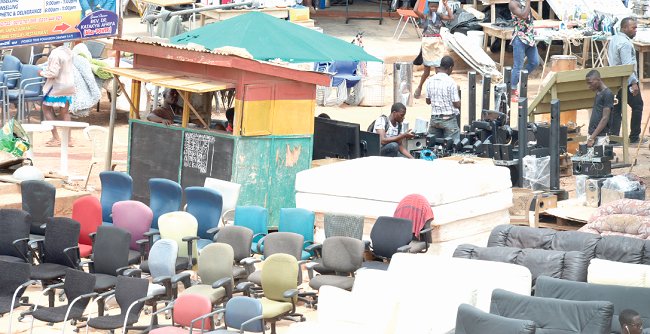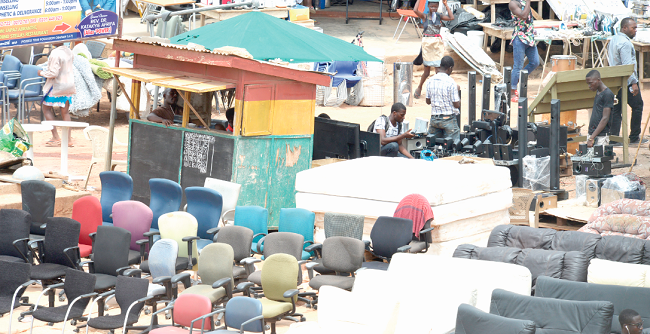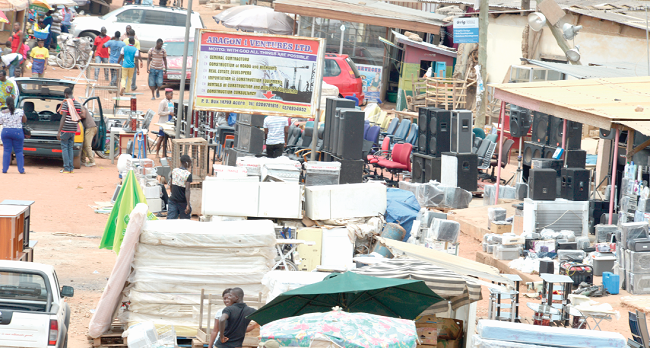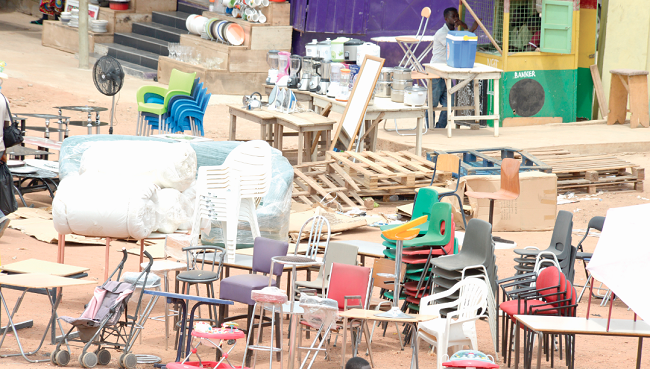Abeka Lapaz - a hub for second-hand goods
Abeka Lapaz is fast growing to become a dumping ground for used goods also known as “obroniwuawu,” literally meaning “the white man is dead.” The area, which is within the Accra Metropolis, is one of the major transiting points to many other parts of the city, and so many passengers, commuters and passers-by see the second-hand items on display from the Abeka Lapaz Traffic Light to the Nyamekye Junction stretch on the N1 Highway, on both sides of the roads.
Advertisement
The items include second-hand clothes, shoes, bags, refrigerators, bicycles, electrical appliances, wheelchairs, cooking stoves, bowls, cups and plates.
Others are foot massages, toys, mattresses, hair dryers, furniture, cooking utensils and spare parts.
Trucks are usually seen unloading the items in front of shops.

During a visit to Abeka Lapaz, some patrons of the second-hand goods were seen anxiously waiting for goods to be unloaded from some containers so that they could make their selection, either for personal use or to sell. The rest of the items are then paraded at the shop for sale.
Without testing to see whether the items, especially electrical appliances, were working or not, buyers just picked them and made payments.
“On the first day when the shipment arrives at the shop, the patrons are eager to select and due to the number of people around to buy, there is no time for testing. They do not even demand testing,” Mr Kevin Boateng, an electrical appliances dealer explained.
‘Borla goods’
According to him, some of the importers do the testing before shipping the items to Ghana but others don’t, and so clients who buy items while the goods are being unloaded from the truck sometimes go home with ‘borla’ (useless) gadgets .
But after day one, clients who visit the shop demand that the appliances they show interest in are tested before they buy them , especially, with regard to television, home theatres, sound systems, rice cookers and other electrical gadgets.
Mr Boateng indicated that some of the importers intentionally brought in goods which were ‘borla’ mixed with few good ones, and so it was up to the customer to be vigilant to make the right choice.
Nonetheless, he said there were some importers who genuinely brought in used, ‘store reject’ goods and brand new items from Europe with good sale prices.

When the items were of good quality, customers did not hesitate to buy because most people preferred the second-hand appliances to the brand new ones.
Concerning furniture, Mr Kwame Aseidu, who is a dealer, told this reporter that the demand was very high and most people preferred them to those made in Ghana.
Mr Peter Agbowaea of K-Aseidu Enterprise, dealers in imported mattresses, explained that the demand for the mattresses was high as most people preferred the imported mattresses to the ones made in Ghana.
However, he said, due to the ban on used mattresses, dealers now imported brand new or ‘store reject’ mattresses.
Patrons are not limited
In Ghana and other parts of Africa, used items from Europe and other parts of the world are considered to be of good quality. In some parts of the country, including Accra, the low purchasing power of many people has given a boost to the trading in used and even discarded items.
Patrons of these second-hand products are not limited to low-income earners but some middle and even high-salaried workers, as well as students, who also perceive the second-hand items to be more durable than brand new items.
On Saturdays, the market at Abeka Lapaz booms. Many people are seen around the stretch moving from shop to shop to make a selection.

When the Daily Graphic visited the area, Mr Derrick Oduro, who had come to inquire about furniture, said he preferred the second-hand furniture to the Ghana because it was durable and of a higher quality.
Another patron, Nana Korang, who had come to buy a king size mattress, said “these mattresses are the best in town. They are more comfortable and durable than the ones that are produced in the country.”
The second-hand items have not only created jobs for the sellers but the taxi and truck drivers who convey the items from their location to the patron’s destination.
“Some patrons come with private cars but still want the taxi driver or mini truck to convey their purchased items,” a taxi driver, Mr Yaw Boakye, said.
Night market
During the evening the second-hand clothes market also booms as people, especially women, transiting from Abeka Lapaz to other parts of the city, also make a stop to select some clothes, shoes or bags.
A regular customer of the night market at the Abeka Lapaz, Maame Serwaa , said she purchased second-hand clothes in the evening because she had ample time to do the selection.
However, because the place is not well lit, she said the traders used torches, a situation which could let a buyer take home rags.
A trader who only gave her name as Awuradwoa, explaining why they came in the evening, said “it is because during the day the AMA guys worry us so much. Moreover during the evening, many people pass by and they have ample time to go through to make their selection.”
The law
It is an open secret that the main sources of these items are developed countries and the items are from those who had given up the items they no longer need or use because they had either outgrown them or bought new ones.
Other items which are no longer in use are bought by importers from the open market
It is also believed that some of the items belonged to the dead and they are released by their relatives to be sent to the poor in other countries.

In spite of a Legislative Instrument (LI 1586) of 1994 banning the importation of used mattresses and other used items such as undergarments, handkerchiefs, brassiers and air-conditioners, their importation has grown in leaps and bounds.
At a meeting with a delegation of management members of some top brands in his office in 2012, the then Minister of Trade and Industry, Mr Haruna Iddrisu, said “We have a legislative instrument - L.I 1586 -- which imposes a ban on the importation of second-hand goods, including mattresses, but the challenge has been the lack of enforcement.”
The Energy Commission also banned second-hand imported refrigerators but it seems that has also not worked as imported fridges are sold alongside brand new ones at Lapaz.
Rules are often made in Ghana with zero enforcement.
Unless the ban on the importation of selected second-hand goods are enforced, Abeka Lapaz will continue to be one of the centres for traders and patrons of such goods.




